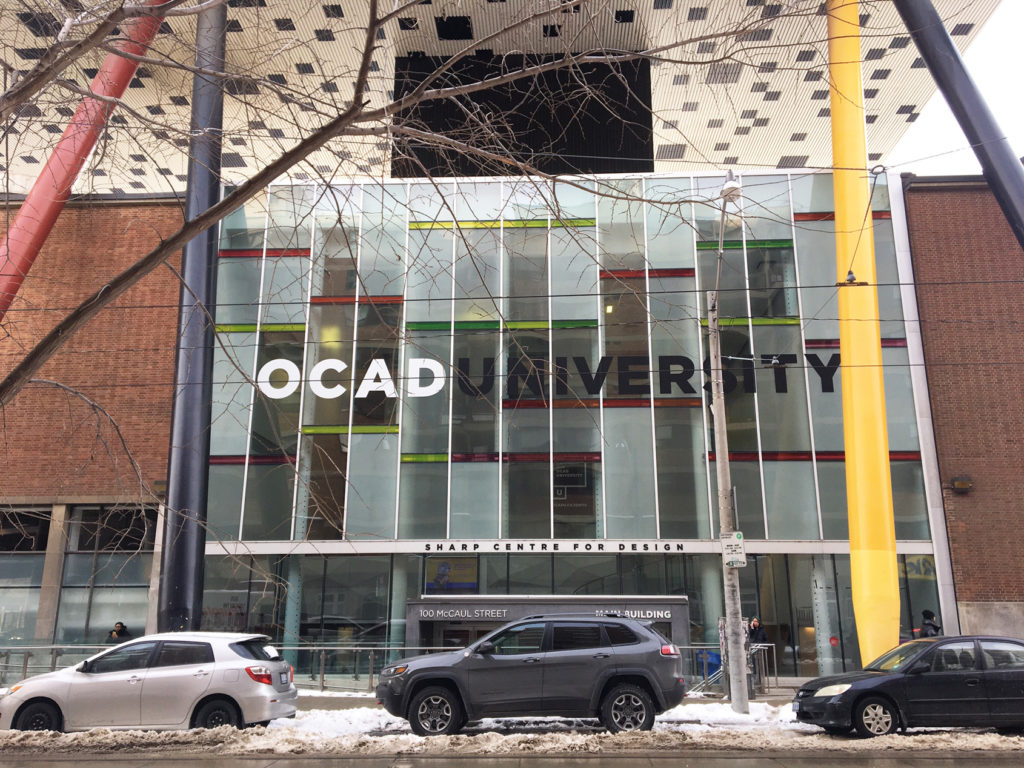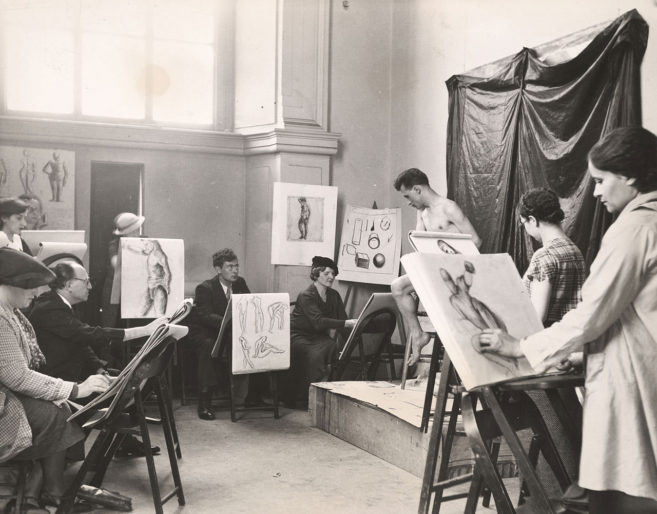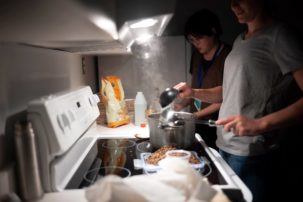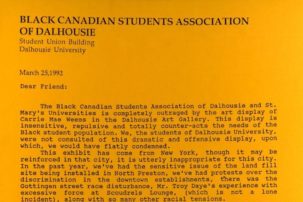On May 3, 2019, dozens of students filled the foyer of the main building at OCAD University—Canada’s largest art and design university—calling for improved accountability at the institution.
The organizer of that action was Meg Feheley, a queer Indigenous student at the school who says they spent more than a year trying to get administrators to address their concerns about an unsafe learning environment.
Prior to December 2017, when they say threatening behaviour from another student began, Feheley believed they had a good handle on navigating OCAD U procedures. But the problems they encountered while trying to get their concerns addressed by administration surprised them.
“It hurts, one, for this to happen to you, and it hurts again when administrators don’t take you seriously,” says Feheley.
They say their case was shifted between multiple staff, that they were presented with confusing and contradictory policy options, that there was little follow up after administrators ostensibly offered supports and that they were left hanging when they actually tried to access promised support, such as Walk Safe.
“As a co-president of the Indigenous Student Association, I sit on a lot of councils and committees, including the Task Force on Indigenous Learning,” Feheley says. “If I can’t come to school safely to attend [a] council meeting, then something is going very wrong.”
Now, OCAD U says it is improving processes and protocols.
Shortly after the May 3 protest, the university commissioned law firm Rubin Thomlinson to conduct an external review of how OCAD U handled Feheley’s concerns.
This week, some two years after Feheley’s original complaint filing and nine months after the public protest action, the university released selected findings from that external review, including the fact that two of the main policies governing misconduct and threatening behavior at OCAD U “were published many years ago and contain information that is out-of-date,” according to the report.
The external review recommends, among other measures, that the university update three of its policies related to misconduct and harassment; that it welcome Indigenous Elders or knowledge-keepers as support people in complaint processes; and that it commit to training relevant administrators in cultural competencies and trauma-informed approaches.
Rubin Thomlinson also found that “the conduct policies themselves do not identify for the user what, if any, culturally relevant resources are available to them.” It recommends inclusion of Indigenous resource people on threat-assessment teams; consultation with an Indigenous resource person when requested by complainants or respondents; and that “in-person cultural competency training and training in Indigenous issues be provided to OCAD U staff who are responsible for administering the OCAD U student conduct policies.”
The review also recommended that “one individual be designated to have oversight of the conduct policies [partly] to ensure that…OCAD U’s compliance with these policies is audited or reviewed.” It adds that “follow-up be included” when dealing with student complaints, and that staff “be trained to ensure they understand…their specific obligations under those policies.”
OCAD U president Sara Diamond says the recommendations “are very solid” and calls the event “a learning moment for us.”
Diamond says implementation of some of the recommendations is already underway. The secretary of OCAD U’s board of governors is now charged with overseeing and auditing conduct policies. And Diamond says that any policy updates will be sent to Rubin Thomlinson for review.
“As an institution we have a very deep concern for equity and diversity and we’ve made it a focus of the institution to address Truth and Reconciliation, decolonization, and Indigenous culture and knowledge,” says Diamond. “But it was clear in reading the recommendations that our processes for investigating complaints were not inclusive enough and had some significant gaps.”
OCAD U is not the only post-secondary institution in Canada to face recent criticism for the way student safety concerns are handled.
At Concordia University in February 2019, the Concordia Association for Students in English put forward a letter requesting departmental “acknowledgement that the complaint system at Concordia and the legislation that supports its silence is broken.”
And at the University of British Columbia in November 2019, the Vancouver Senate of the university tabled a report from the Office of the Ombudsperson for Students that made a number of observations and recommendations to improve student complaints processes.
Though the complaint cases at UBC and Concordia were different from that at OCAD U—sexual harassment versus other kinds of safety concerns, and teacher-student versus student-student—it’s clear that accountability remains a problem at multiple arts-education institutions.
Still, OCAD U’s track record has left some current and former students concerned about how successfully any new recommendations might be implemented.
“I don’t feel hopeful, based on how I’ve seen things happen. I haven’t seen the change in attitude that would make me hopeful things will change,” says Amanda Amour-Lynx.
Amour-Lynx, a former OCAD U student, is an Indigenous person and sexual assault survivor with PTSD and chronic illness.
“I feel like the school retraumatized me when I was trying to heal from [an] assault and PTSD,” Amour-Lynx explains. In making her accommodation requests, she says, her files were lost, her cultural protocol concerns went unaddressed and she was made to feel she was a problem.
“I think in particular Indigenous folks and queer/POC folks feel a responsibility to look out for their kin and ensure the same things don’t happen in future to others,” Amour-Lynx says. She was especially surprised by her experience given that pre-existing school policies ostensibly support victims of sexual violence, as well as Indigenous students. “I was actually left to believe I shouldn’t be accommodated,” she says. In her opinion, “it’s only after the school’s public image becomes tarnished that things change.”
Carly Bruce, a current OCAD U student, says that after she tried to report a harassment experience and was met with what she felt was inadequate response from the university, she didn’t even bother reporting another, separate incident months later. “After that [first try] I didn’t trust OCAD too much in terms of how they handle things,” Bruce says.
For her part, Sara Diamond, who will finish her third term as OCAD U president in June and become president emerita following that, seems confident the situation for students filing complaints will improve in the near- and long-term.
“We can do a significant part of this work [implementing recommendations] while I am still president,” Diamond says, “and then I will ensure the incoming president is well versed in this process too.”
Diamond believes much will improve once the review’s recommendations are in force.
“One of the things the report did find is that our staff did make extensive efforts to address the complainant’s concerns,” Diamond says. “This wasn’t a case of inaction. But we realize students and staff would have been better served with policies that were more inclusive in terms of how they could be used effectively.”
Meg Feheley, like members of the public, now has access to the key written recommendations of OCAD U’s external review—but not the full text of the review, says the university, due to confidentiality concerns.
Feheley, who continues to study at the university, says they will be watching to see how well the recommendations are implemented in the coming weeks and months. Right now, they are still reflecting on OCAD U’s responses.
“I reject the conclusion OCAD University has drawn from this report,” Feheley stated today, in an email to Canadian Art. “Is this what OCAD University means by action? That they acted on policies that are outdated, dangerously neglectful and leave students without viable solutions or direction to follow through their complaints?
“I feel some modicum of relief in seeing the recommendations released, but they come too late for me,” Feheley adds. “They come because of extreme, prolonged suffering and only because I refused to let what happened to me go. At the end of everything, I am not even being provided a copy of the full report of what happened to me.”

 A view of the main building at OCAD University on January 22, 2020. Photo: Leah Sandals.
A view of the main building at OCAD University on January 22, 2020. Photo: Leah Sandals.







